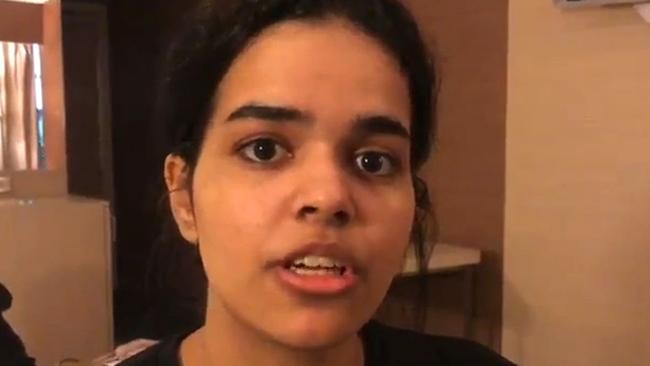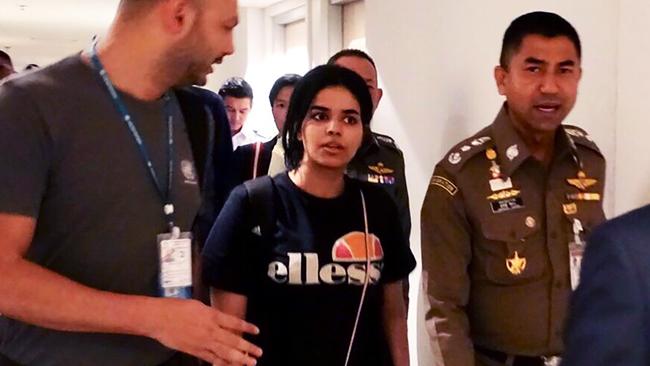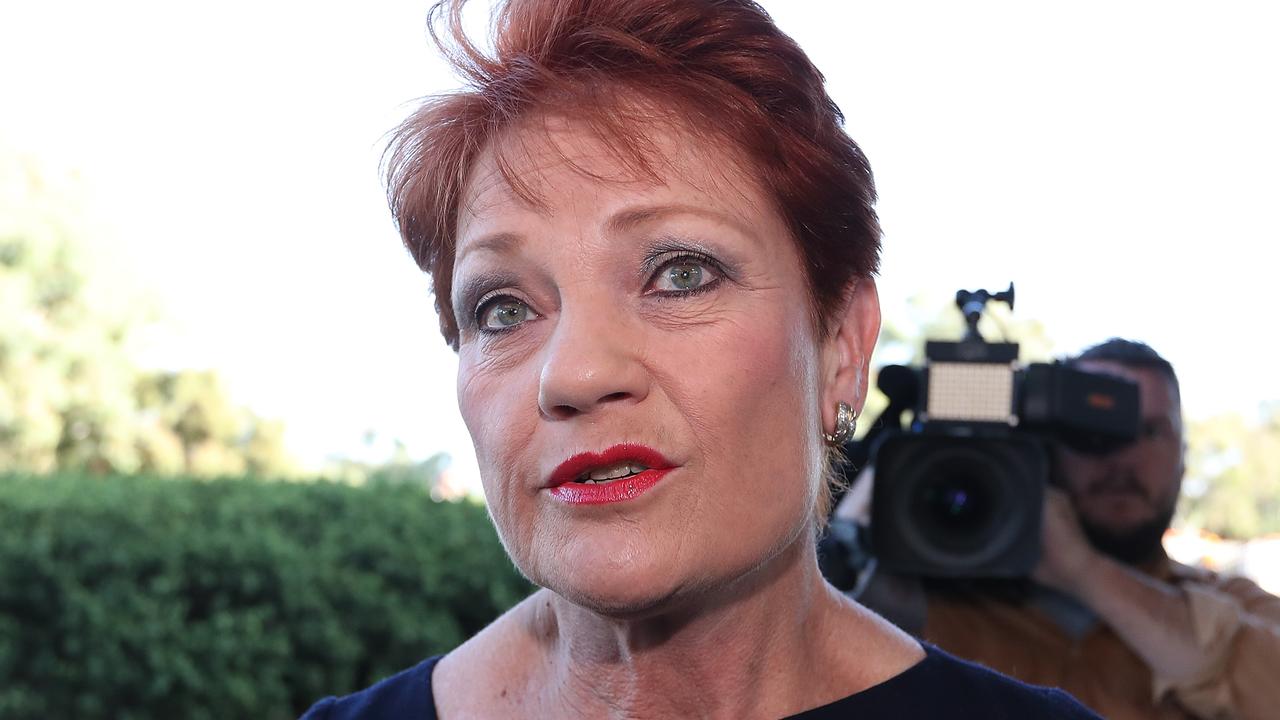How Saudi teen Rahaf Mohammed Alqunun slipped in race for freedom
A potentially fatal mistake nearly brought a Saudi teen’s escape from an allegedly violent father to a disastrous end

Saudi teenager Rahaf Mohammed Alqunun was a critical step closer to freedom yesterday after the UNHCR declared her a refugee and the Australian government agreed to formally consider her bid for asylum.
The announcement, and speculation by Thai authorities that she could be resettled within two days, sparked immediate celebrations among the Twitter support base for the 18-year-old, whose pleas for help over social media in recent days attracted international attention.
By late last night, it appeared more likely the teen’s asylum bid would be granted amid rumours she had been to the Australian embassy in Bangkok, and after she tweeted a picture of herself smiling with the caption: “Hey, I’m happy.”
Just days earlier, a potentially fatal mistake nearly brought her escape from an oppressive state and an allegedly violent father — a senior government official with two wives and 10 children, eight of them girls — to a disastrous end.
Rahaf’s escape had been planned for months with the help of friends who had fled Saudi Arabia before her. She was to fly via Thailand to Australia, having obtained a tourist visa, and once here she intended to formally seek asylum.
As the frightened teenager stole away from her family’s holiday hotel rooms in Kuwait after midnight last Saturday and caught a taxi to the international airport, friends in Canada, Sweden and Australia took turns to talk her through the ordeal.
“Don’t be afraid, the freedom is really worth it,” they said. Most importantly, they warned, do not stop until you reach Australia.

Rahaf had wanted to stop in Bangkok, breathe the air as a free woman — just for a day or so — before tackling the next big hurdle in Australia of seeking asylum.
“We friends said ‘no, you cannot stay. It’s too dangerous’,” Shahad, a 19-year-old Saudi woman now based in Sweden after escaping her own family two years ago, told The Australian. “We say that to every woman who wants to skip Saudi. Rahaf chose Thailand because she believed there was no Saudi embassy there. She thought it was not a dangerous place.
“We bought her a ticket to Australia from Thailand but she didn’t listen to us.”
When an official in the Bangkok arrivals lounge offered to help Rahaf get a Thai visa she handed over her passport. An hour later he returned with more officials and told her she would be sent back to Kuwait, and that her father was “very angry”.
“When she told us that, we knew the Saudi embassy would try to take her back,” Shahad said. “We decided to stay (online) with her in shifts, one going to sleep and the other two girls staying awake.”
The story of Rahaf Alqunun’s escape, how she barricaded herself in a Bangkok airport hotel room to avoid deportation on Monday — all the while posting increasingly desperate tweets for help — has drawn the sympathy of millions whose understanding of the Saudi regime has been fundamentally altered by the murder in October of Saudi journalist Jamal Khashoggi inside his country’s Istanbul consulate.
For millions of Saudi women and girls living lives of daily oppression under the country’s guardianship laws it is a bitter reality that it took the killing of one man to turn world attention to the human rights abuses of the Middle East kingdom.
But there is no doubting the effect of the international social media campaign mounted in response to Rahaf’s plight, which convinced Thai authorities late on Monday to back away from deportation and allow the UNHCR to urgently assess her asylum claim. Saudi embassy officials acknowledged as much on Tuesday in a meeting with Thai immigration police chief Surachate Hakparn, parts of which were filmed and uploaded to Twitter. In one exchange, a Saudi official observes: “She opened a Twitter account and her followers grew to 45,000 within one day. It would have been better if they confiscated her cell phone instead of her passport because Twitter changed everything.”
If only Dina Ali Lasloom had been so lucky. The young Saudi woman was transiting through The Philippines in 2017 on her way to seek asylum in Australia when she was kidnapped by male relatives in the airport and carried — bound, gagged and screaming — on to a flight back to Saudi Arabia.
Her fate is unknown, though Shahad has little doubt she met the same brutal end as other Saudi women and girls seen to have brought shame on their families and who are killed to restore clan honour.
That same year Shahad escaped a violent father and an arranged marriage to a 40-year-old man during a family holiday in Turkey. She took a taxi over the border to Georgia, throwing her relatives’ passports in the bin as she left to slow their pursuit.
She has been flooded ever since with Twitter appeals from women and girls seeking help to escape Saudi Arabia, whose laws severely restrict women’s freedom of movement and force them to seek permission from a male guardian for every significant decision in their lives.
Last April, it was her friend Rahaf who sought her advice on who to contact for protection, setting her own escape bid in train. Over coming months the teenager saved to buy her flight and an online Australian tourist visa ahead of a planned family holiday in Kuwait.
Rahaf now awaits an asylum offer. She has already publicly appealed to Australia, Britain, Canada, Sweden and the US for help. There are still concerns for Rahaf’s safety, particularly while her father and brother are in Thailand. She has said many times her family will kill her if she is returned. She has also renounced Islam, which in Saudi Arabia is a crime punishable by death.
Yesterday her father met the UNHCR and later the Thai Immigration chief who said after the meeting that the father was not happy Rahaf had been granted refugee status, he wanted to challenge the decision and intended to stay in Thailand until he knew where his daughter was going.
“They wish to take her home and his wife is very ill with worry,” General Surachate said.
Australian immigration officials have backtracked on suggestions Rahaf’s asylum bid could be fast-tracked, and the Home Affairs Department insists she will receive no special treatment.
Meanwhile, Foreign Minister Marise Payne will be in Thailand today to lobby for the release of another Middle Eastern asylum-seeker, Melbourne-based Bahrainian footballer Hakeem al-Araibi, who has Australian residency but was detained in Bangkok last month over an erroneous Interpol Red Notice.
Additional reporting: Greg Brown



